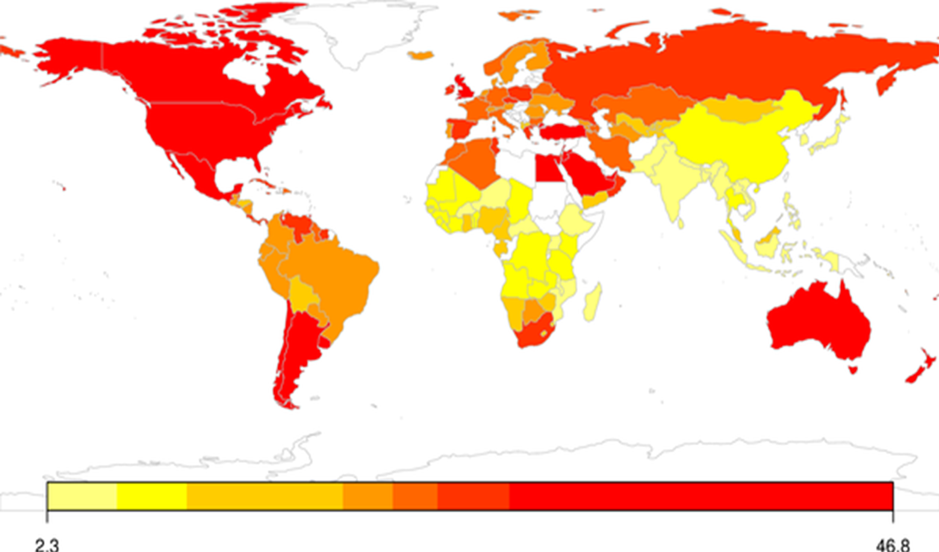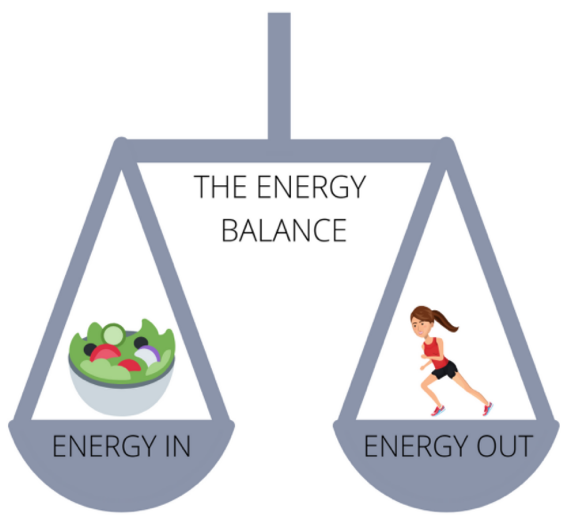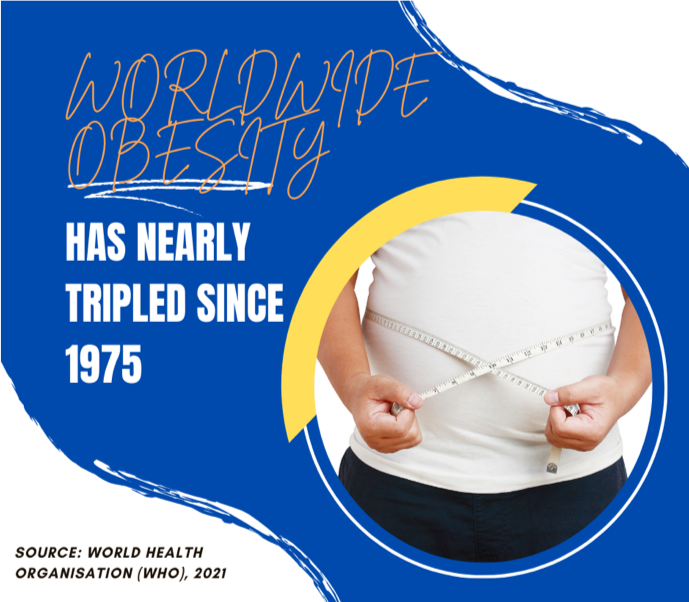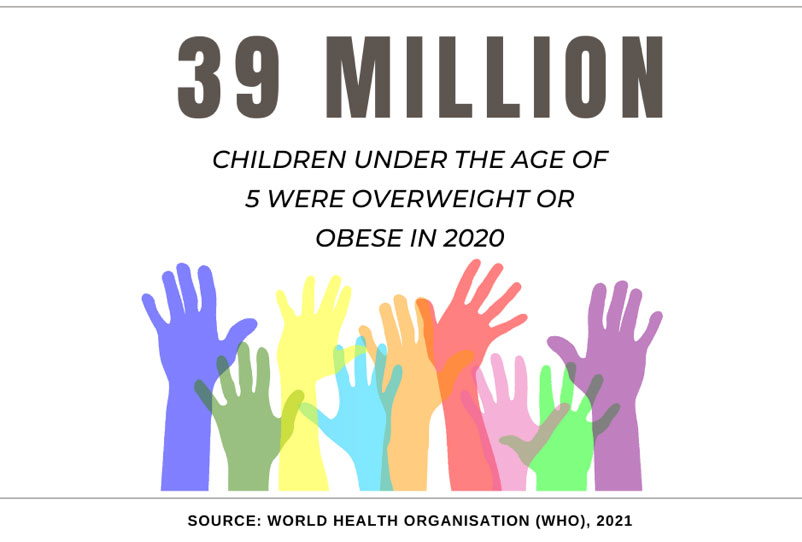Obesity: Getting The Right Facts About Fats
March 4, 2022, marks the celebration of ’World Obesity Day‘. According to the World Health Organization (WHO), obesity is an abnormal or excessive fat accumulation in the body that may impair health. It is an epidemic that is worsening in most parts of the world and is a major public health concern in Malaysia, where it has been on the rise for the past 20 years. Measuring Body Mass Index (BMI) is the simplest way to determine whether an individual is overweight or obese. As such, adults with a BMI of 30 and over are considered as obese. The figure below shows the current obesity prevalence around the world including in Malaysia.
Prevalence (%) of adult obesity in 147 countries worldwide.

Source: Talukdar et al., 2020. PLOS ONE 15(5): e0232236.
What causes obesity?
 The fundamental cause of obesity is excessive calorie intake paired with an inactive/sedentary lifestyle (low energy expenditure). An inactive lifestyle may be influenced by multiple factors, including working conditions (more time sitting at a desk), ease of transportation, urbanization, and increased screen time (i.e. watching television, using portable electronic devices such as mobile phones and playing video games). People are now more comfortable driving a car than walking to even nearby places. At your fingertips, even meals can now be delivered all the way to your doorsteps. Lack of awareness on health also contributes to the inactive lifestyle among the community. This problem needs to be addressed to curb obesity, especially in Malaysia.
The fundamental cause of obesity is excessive calorie intake paired with an inactive/sedentary lifestyle (low energy expenditure). An inactive lifestyle may be influenced by multiple factors, including working conditions (more time sitting at a desk), ease of transportation, urbanization, and increased screen time (i.e. watching television, using portable electronic devices such as mobile phones and playing video games). People are now more comfortable driving a car than walking to even nearby places. At your fingertips, even meals can now be delivered all the way to your doorsteps. Lack of awareness on health also contributes to the inactive lifestyle among the community. This problem needs to be addressed to curb obesity, especially in Malaysia.
How did we get to where we are today?
In terms of nutrition, calories (or energy) are contributed by 3 macronutrients; carbohydrates, fats, and protein. In the 1960s, fat intake, especially saturated fats, was linked to obesity, increased risk of heart disease and stroke, and therefore it should be avoided. This was widely accepted and health experts had recommended consuming low-fat foods and replacing saturated fats with vegetable oils. As a result, consumers started buying low-fat or fat-free products with little awareness that these products often contain high amounts of refined carbohydrates (including simple sugar). The switch to consuming low-fat or fat-free products had dramatically increased the intake of simple sugar, hence tripling global obesity and diabetes rates. More scientific studies have found that simple carbohydrates and refined sugar are more harmful to health than saturated fats.

The switch to consuming low-fat or fat-free products had dramatically increased the intake of simple sugar, hence tripling global obesity and diabetes rates.

Does eating fat cause obesity?
Palm oil is the most widely used cooking oil among the consumers in Malaysia as the nation is one of the world’s largest producers. This makes palm oil an easy target as the cause of obesity here, for those who still adhere to the outdated dietary recommendation. As a matter of fact, fat is an important macronutrient and is a source of essential fatty acids, which the body cannot make itself. We need about 30% of our total daily energy intake to be from fat. This means we need about 67 g of fat (out of a total of 2,000 calories of energy) every day. Fat plays many important roles in our bodies. Fats act as an insulating layer under the skin, protects important organs and is required for the production of hormones and the structure of cells in the body. Fat also helps the body absorb vitamins A, D, E and K.
Emphasizing energy balance (including portion control) and the selection of healthy fats to replace simple carbohydrates and refined sugar are key to preventing overweight and obesity problems. Fat helps to increase satiety and for those who want to reduce calorie intake, low-fat food is not a good choice because it often contains high sugar. The glycaemic impact of refined carbohydrates and sugar leads to insulin resistance, inflammation and altered hormones levels. Consequently, these can potentially increase the risk of developing metabolic disorders, such as obesity, heart disease and diabetes. Instead, it is recommended to choose foods that are balanced and rich in nutrients, as well as to cut down on processed foods that are high in refined sugar and trans-fats.
Trans-fats are high in vegetable oils (e.g. canola and soybean oil) that are partially hydrogenated to make them semi-solid, in order to replace animal fats in processed foods. Trans-fats are harmful to health as they can cause obesity and heart disease, even if consumed in small amounts. According to WHO, it is recommended to consume less than 1% of our total daily energy intake from trans-fats, which is less than 2.2 g trans-fat per day. Therefore, trans-fats should be eliminated from our diet. Palm oil is free of trans-fats and like other vegetable oils, it also does not contain cholesterol.
Balanced diet and active lifestyle
Awareness of a balanced diet and active lifestyle should be nurtured among the community as early as possible to curb the problem of obesity in our country. Robust active lifestyle campaigns are needed to encourage the community to exercise more often in order to achieve the ideal body weight and maintain good health. Finally, the selection of “wholesome” foods that contain healthy fats such as palm oil compared to low-fat products, not only helps to support good body functions, but also aid in the absorption of fat-soluble vitamins such as vitamins A, D, E and K. Palm oil has a balanced unsaturated and saturated fat composition, and is rich in beneficial minor components.
Reference:
- Talukdar D, Seenivasan S, Cameron AJ, Sacks G (2020). The association between national income and adult obesity prevalence: Empirical insights into temporal patterns and moderators of the association using 40 years of data across 147 countries. PLOS ONE 15(5): e0232236. https://doi.org/10.1371/journal.pone.0232236
- WHO (2021). Obesity and overweight. https://www.who.int/ news-room/fact-sheets/detail/ obesity-and-overweight.

